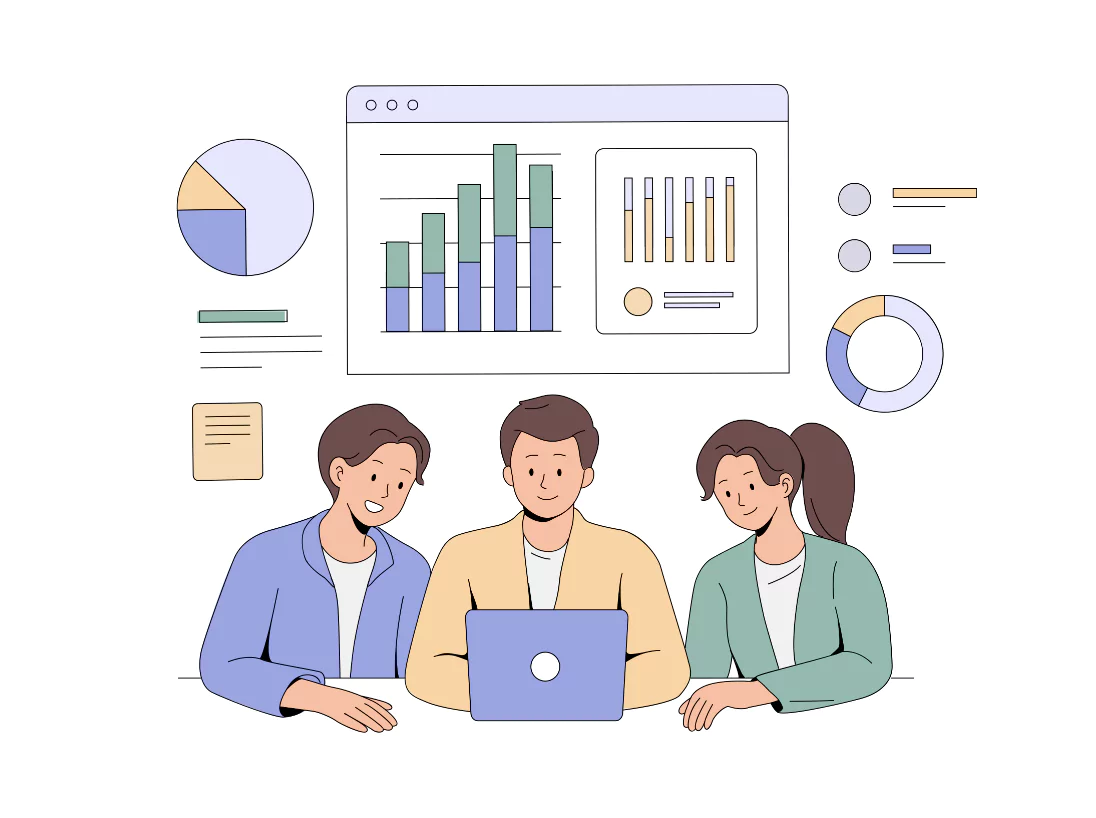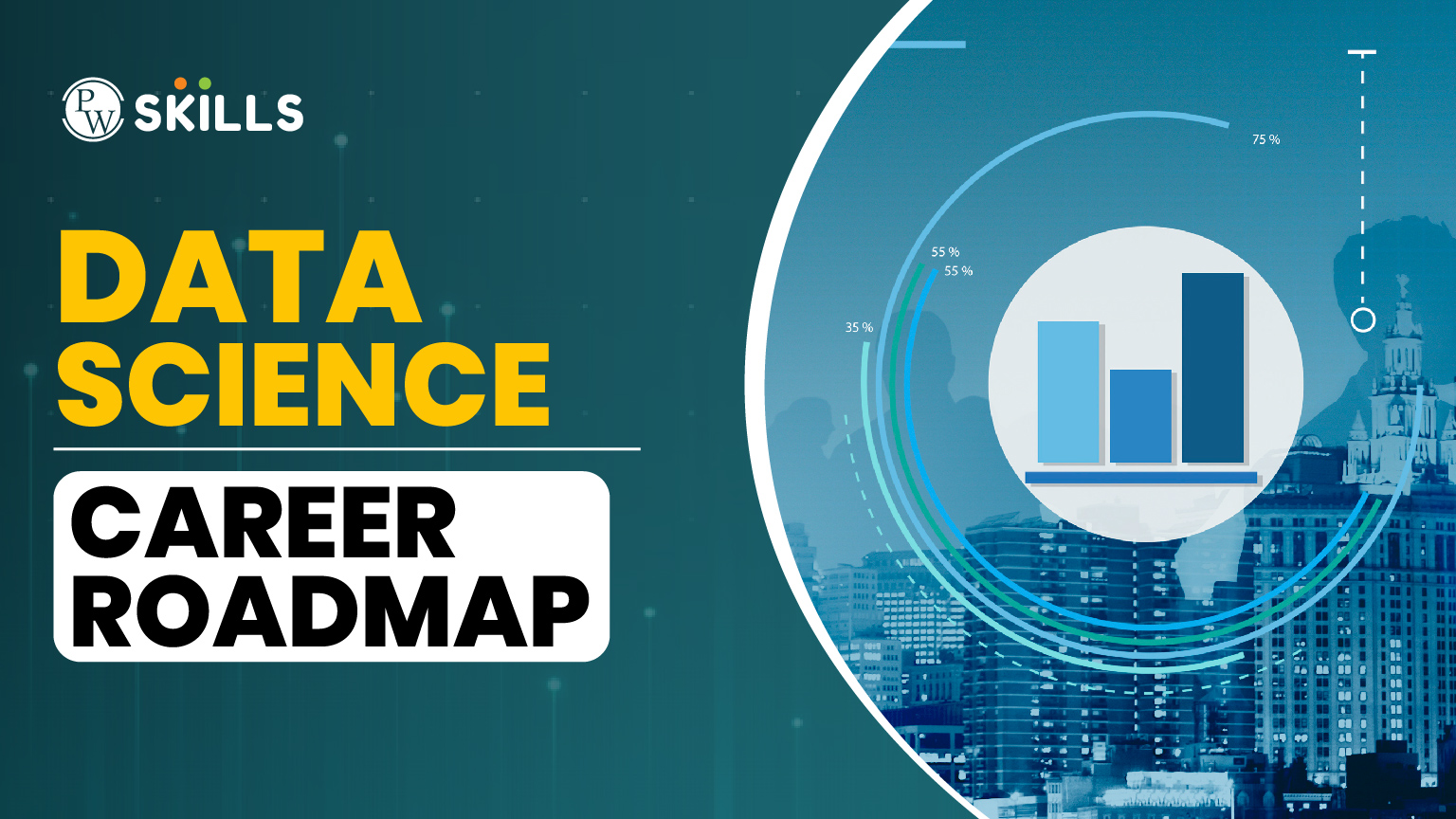People nowadays are crazy about careers in the data science field and hence data science career roadmap is something that might help you plan your preparation journey ahead. As organizations strive to remain competitive and make informed decisions, the role of data professionals has never been more critical.
A data science career provides a structured pathway into one of the most in-demand fields globally, offering both intellectual satisfaction and professional growth.
This is a comprehensive resource for individuals considering or progressing through a data science career. It outlines a clear roadmap, from entry-level positions to senior leadership roles, and includes a job leveling matrix to help professionals understand the expectations and opportunities at every stage.
Data Science Career Roadmap For Beginners

A well-defined Data Science Career Roadmap helps aspiring professionals navigate the complexities of the field by breaking down skill sets, roles, and progression paths.
Whether you are a recent graduate, transitioning from another field, or advancing within your organization, having a clear vision of your journey is essential.
Level 1: Beginner
Beginners typically hold internship or junior roles. Key responsibilities include handling structured data, using Excel or SQL for basic analysis, and creating simple visualizations.
Level 2: Intermediate
Intermediate professionals begin working with tools such as R or Python and engage in more advanced data manipulation, statistical modeling, and machine learning.
Level 3: Advanced
At this level, practitioners build complex data models, apply predictive analytics, and integrate business context into their data solutions. This level directly influences the decision making power of an organisation.
Level 4: Expert
Experts manage large-scale analytics or engineering initiatives, drive strategy, and often mentor junior team members. You will need to master different data science tools, frameworks and more at this stage.
Level 5: Leader
Leaders in a data science career oversee entire teams or departments, develop strategic plans, and align data initiatives with organizational goals.
Roles in Data Science For Future Careers

The majority of roles in data science allows professionals to specialize in areas that match their interests and strengths. Each role contributes uniquely to data-driven success.
1. Data Analyst
Data Analysts transform raw data into meaningful insights using SQL, Excel, and data visualisation tools. As they progress, they incorporate predictive modeling and business strategy into their analyses.
Career Path of a Data Analyst:
- Intern
- Data Analyst
- Senior Analyst
- Analytics Manager
- Director of Data Analytics
2. Data Engineer
Data Engineers design and maintain data pipelines, optimize database systems, and support large-scale Data processing. Their expertise ensures data is accessible and reliable for analytics.
Career Path of a Data Engineer:
- Intern
- Junior Engineer
- Engineer
- Senior Engineer
- Data Engineering Manager
- Chief Data Architect
3. Machine Learning Engineer
These professionals specialize in building and deploying machine learning models. They master advanced algorithms, deep learning, and automation to enhance data-driven solutions.
Career Path of a Machine Learning Engineer:
- ML Assistant
- Junior ML Engineer
- Engineer
- Senior ML Engineer
- ML Manager
- Head of ML
Data Scientist
Data Scientists apply statistical analysis and machine learning to extract insights from data. They progress into roles that require research leadership, innovative modeling, and R&D direction.
Career Path of a Data Scientist:
- Intern
- Data Scientist
- Senior Scientist
- Lead Scientist
- Chief Data Scientist
AI Specialist
AI Specialists focus on developing intelligent systems using neural networks, TensorFlow, reinforcement learning, and ethical AI frameworks.
Career Path of an AI Specialist:
- Intern
- Junior Specialist
- Specialist
- Senior Specialist
- Lead AI Specialist
- Director of AI
BI Developer
BI Developers create dashboards and reports that empower decision-making. As they grow, they lead analytics strategy and oversee enterprise-wide business intelligence initiatives.
Career Path of a BI Developer:
- Intern
- Junior Developer
- BI Developer
- Senior Developer
- BI Strategist
- Director of BI
Educational Pathways to Advance Your Data Science Career
While there is no one-size-fits-all educational requirement, most professionals begin a data science career with a bachelor’s degree in Computer Science, Statistics, Mathematics, or a related field.

You will have to build a strong knowledge in Mathematics, Statistics, computer science, and more during your data science career roadmap. After completing your bachelor’s degree you can enroll in a data science program to start learning core concepts, industry oriented tools, and hands-on learning in data science.
To advance, consider the following:
- Certifications
- Master’s Degree
- Continuous Learning
- Soft Skills
Read More: How to Transition from Business analyst to data science professional in 2025?
How to Strategically Progress in Your Data Science Career?
The following are some strategies along with your Data Science career roadmap to progress in your Data Science career:
1. Self-Assessment
Begin by understanding your current technical strengths, business understanding, and soft skills. Assess your knowledge level and start learning more with a well defined course module. Learn all major fundamentals of data science, in-demand tools and frameworks, best techniques and more.
2. Skill Acquisition
Identify the next-level competencies for your role. For example, a Junior Data Scientist might focus on mastering deep learning or model deployment. Learn industry oriented skills to make yourself job ready and ahead of other candidates who are looking for the same job role.
3. Real-World Projects
Apply your skills in real business contexts, through internships, freelancing, or contributing to GitHub repositories. This accelerates practical understanding and strengthens your portfolio.
4. Networking and Mentorship
Engage with data science communities. Learn from mentors who’ve advanced in their data science career and can offer personalized advice. The more you connect with people the better opportunities you will get in your data science field.
5. Transitioning to Leadership
To reach strategic roles, focus on decision-making skills, stakeholder communication, and cross-functional collaboration. These are as crucial as technical capabilities for your data science career roadmap.
Common Challenges in Data Science Career Development

Despite its promise, a data science career roadmap comes with different obstacles. Here’s how to navigate them:
- Ambiguity in Role Definitions: Not all companies define data science roles the same way. You must clarify expectations during interviews or promotions as it is important to be aware of your roles & responsibilities based on your strengths. Prepare for a specific role during your Data science career roadmap journey.
- Skill Overload: Avoid trying to learn everything at once and rather focus on your specialization while maintaining a broad understanding of core concepts in data science.
- Imposter Syndrome: It is common, especially in high-achieving environments. Track your progress and seek feedback often to monitor your progress throughout the learning journey.
- Evolving Tools: Always keep yourself updated with relevant tools in the data science industry and dedicate time each week to explore new technologies and approaches.
How to Make Use Of Job Leveling Matrix for Data Science?

It is very much important to keep assessing your preparation level and data science career roadmap is something that might help you a lot. Let us know about the Job leveling matrix for data science.
- Know your Skill Level: Make sure you are familiar with your strengths and weaknesses for the role you are preparing for in data science. Always keep taking updates for your role in data science.
- Plan your movement: Know your skills that you need to develop, choose industry based skills which are still used frequently in practice and advance your knowledge to gain an edge in your career.
- Transition Ahead: Prepare for the data science responsibilities and master technologies to move ahead in your career for a management or leadership role.
Future Outlook of Data Science Careers
According to the U.S. Bureau of Labor Statistics, data science roles are projected to grow by over 35% in the next decade. The increasing reliance on data-driven decisions ensures that the data science career landscape will continue to expand, diversify, and offer meaningful work opportunities globally.
Emerging fields such as ethical AI, automated machine learning (AutoML), and explainable AI (XAI) will redefine what it means to be a data scientist, creating new leadership roles and technical tracks for future professionals.
Also Read:
- Complete Guide To Kaggle For Data Science
- What are AI Ethics? Importance And Best Practice
- Pros and Cons of Online Data Science Degree
- Introduction To Convolutional Neural Network In Machine Learning
Build a Career in Data Science with PW Skills
Become a master in Data Science with PW Skills Data Science with Generative AI Course. Learn in demand skills and frameworks in this 6 months industry led live session course. Get tutored by dedicated mentors throughout the program and gain industry related skills with a well defined data science career roadmap.
Strengthen your portfolio with Practice exercises, module assignments, real world projects and practical insights in the industry. Also, get an industry oriented certificate after completing the course only at pwskills.com
Data Science Career Roadmap FAQs
Q1. What is the starting point for a data science career?
Ans: You can start with a solid foundation in statistics, programming (Python or R), and data analysis tools like SQL and Excel.
Q2. How long does it take to grow in a data science career?
Ans: It typically takes 1–2 years to move from beginner to intermediate, and 5–8 years to reach leadership roles.
Q3. Can non-tech professionals switch to a data science career?
Ans: Absolutely. Many professionals transition successfully by upskilling through online courses and real-world projects.
Q4. What industries offer data science career opportunities?
Ans: Almost every industry, including finance, healthcare, retail, tech, and manufacturing, now hires data science professionals.

